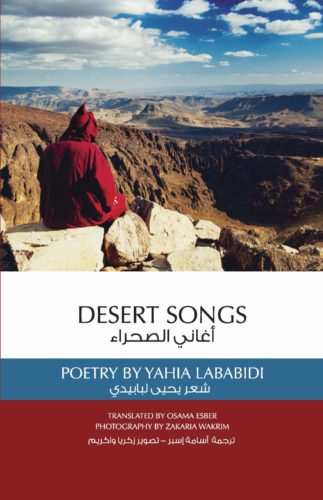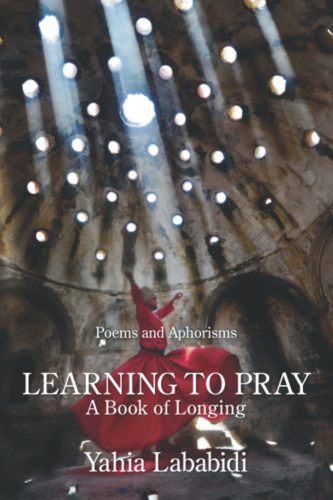
Collections of Yahia Lababidi’s Verses and Aphorisms: Desert Songs and Learning to Pray
Yahia Lababidi describes Desert Songs as “a slender love letter to the deserts of Egypt.” The poems in Arabic with English translations by Osama Esber and photographs by Zakaria Wakrim create a new experience in the reader’s mind. The desert assumes a life of its own. Sometimes I find myself retracing the footsteps of travelers on the shifting sands while the white of the sky merges with the white and dark shadows below. Sometimes I am transfixed by white Arabic calligraphy on black sheets of paper. I do not need to read or understand. I let it speak to me of distant lands and their stories while I experience the solitude of the “myriad souls,” the “desert lament,” and the “stillness.”
I read “Desert Revisited” out loud to savour each word, to dwell on it, and to try to reach the end before experiencing the beginning. “Eternity Beckons” disrupts while “the Muse makes a mockery of words.” “Mountain Meditation” is reminiscent of storytellers “sworn to secrecy,” rendered “mute” yet “pitiless” and “invincible,” whereas “Hermetic” conjures up images of “bearded black beetles” and “men in dresses cut out of the night.” And finally, when “Dusk Scuttles” at the end of Desert Songs, the black and white transform into the many blazing hues of the desert sun gleaming like “a dark jewel of a sea.”
No review of Desert Songs would be complete without mention of the superb translations by Osama Esber and photographs by Zakaria Wakrim. Osama Esber, author of On My Sea Routes (2020) and On the Bank of the River of Things (2021), has “translated many books from English into Arabic for a selection of Western poets, writers and thinkers.” Zakaria Wakrim’s photographs are from the “Amarg” series, “the Amazigh (Berber) word for nostalgia, also used to signify a hybrid form of musical poetry found in Southern Morocco.”

The spirit that guides this book is expressed in the Preface, where the author explains how “organized religion” that seems to have lost its relevance has created a vacuum now being filled by art, literature and poetry, which lead us to the “threshold” of “that quiet capital of riches: Silence.” It is this contemplative stillness that helps us understand our “spiritual condition” and creates that calm “gaze at eternal things… over the head of our troubled times.”
Yahia acknowledges the lives and works of the “saints and mystics” who provided him with “moral guidance and uplift.” Foremost among these are Rumi, Kahlil Gibran, Omar Khayyam, Al Ghazali, and Rilke. Yahia explores “the idea of artists as mystics and the worship of beauty as a form of prayer.” He calls his collection of poems and aphorisms “a volume of prayerful writing, a sort of unconscious spiritual autobiography.”
The poems are a tribute to stillness, the moment, the secret, the earth, with a Dervesh-like swirling of the universe: “a whirling skirt of sky,” mesmerizing in its movement, transfixed in motion, “dissolving” in “the presence of silence” to uncover “the immutable letter,” the beginnings, the “(first of the alphabet) Alif.” (p 27)
“Hope,” a poem of ten lines, is a beautiful and well-crafted example of reaching out to the depths and heights of the Eternal. Hope is fragile and “out of breath.” It “cries itself to sleep,” its presence felt in its intensity during times of desperation and in its unique ability to “keep a secret.”
Again, in “Words,”Yahia’s brilliant use of personification conjures up the “dance” of words, a solo performance, or one “with an invisible partner” – “every word is a cosmos/dissolving the inarticulate.”
In “Afterthought,”Yahia poses the eternal question of what happens “when we pass.” The expression of beauty in pain and suffering is a constant presence in his poems. In “I Ran,” he writes:
But, when I got lost
my pain found me—
caressed me, wordlessly
and carried me Home.”
Each poem transports the reader into a world away from this world like a “Gradual Escape”from “old age”:
One day, I’ll finally slip out this
loosening body bag
Simply sling it over the shoulder
of my sturdy spirit.
My favourite section is the one on aphorisms: lyrical, clipped words strung together like rosary beads, powerful in their brevity, brutal in kindness. I will conclude with a few examples below and with my thanks to Yahia for these gifts of words, thoughts, stillness.
Poetry is what we say to ourselves, when there’s nowhere left to hide.
p 104
Poems are like bodies—a fraction of their power resides in their skin. The rest belongs to the spirit that swims through them.
p 95
Aphorisms respect the wisdom of silence by disturbing it, briefly.
p 97
There’s some mysticism in poetry; but, there’s poetry in all mysticism.
p 114
Compassion is to recognize the role we play in the creation of our enemy.
p 107
For more on Yahia Lababidi, please refer to the ABC podcast (Sunday, May 22, 2022), “Salvaging the light: Poet and aphorist Yahia Lababidi.”








